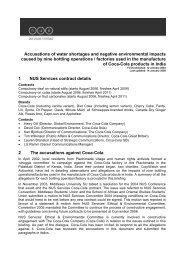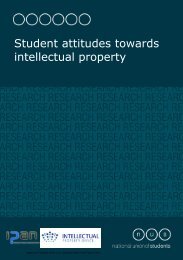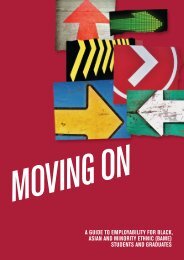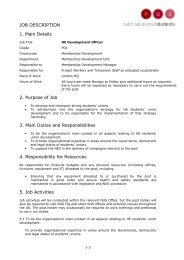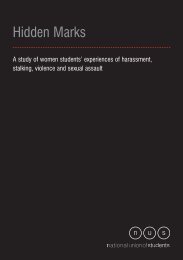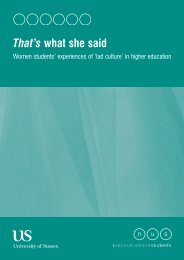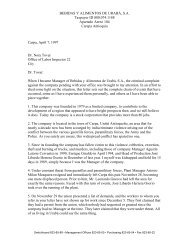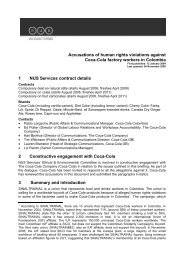No Place for Hate Crime - National Union of Students
No Place for Hate Crime - National Union of Students
No Place for Hate Crime - National Union of Students
Create successful ePaper yourself
Turn your PDF publications into a flip-book with our unique Google optimized e-Paper software.
The impact on victims<br />
This was observed in low-level incidents as well as<br />
those that did not specifically target the individual<br />
per se – <strong>for</strong> example, the distribution or display<br />
<strong>of</strong> prejudiced material. Such a finding holds great<br />
significance, suggesting that it is less the incident itself<br />
than the motivating prejudice behind the incident that<br />
is most injurious. This is what makes the incident an<br />
attack specifically on the individual’s sense <strong>of</strong> self and<br />
identity. Moreover, what makes an ‘everyday’ case <strong>of</strong><br />
verbal abuse so erosive and repressive is not only the<br />
utterance, but also its implicit reference to uncritically<br />
held opinions among ordinary people that are difficult to<br />
challenge.<br />
“[I feel] a sense <strong>of</strong> helplessness that this kind <strong>of</strong><br />
incident will never stop and will be something I will<br />
always have to put up with in my day-to-day life.”<br />
“When seeing people laughing at such graffiti it<br />
reminds me that many people think anti-gay remarks<br />
are just a joke and somehow acceptable.”<br />
“It wasn’t a specifically hateful attack, but I think it is<br />
important to take into account that jokes that revolve<br />
around a person’s sexuality do culminate to making<br />
people feel depressed. Yes, it may be a joke but if<br />
it recurs <strong>for</strong> a long amount <strong>of</strong> time, never-changing<br />
and constantly in the background, then it can<br />
cause repercussions. It matters not how seemingly<br />
oblivious other people are to the situation, but how<br />
the person(s) targeted feel [about] such abuse.”<br />
“I am finding it increasingly difficult to work with<br />
cisgender people on LGBT issues and even more<br />
difficult to trust feminists – and that’s just because <strong>of</strong><br />
this particular series <strong>of</strong> incidents.”<br />
This finding clearly demonstrates how such<br />
occurrences affect community cohesion by<br />
encouraging mistrust and suspicion. In turn, this results<br />
in isolation, exclusion and barriers to communication.<br />
Effect on studies<br />
One in 10 incidents involving prejudice against the<br />
victim’s sexual orientation and 9 per cent <strong>of</strong> those<br />
related to their gender identity affected victim’s<br />
studies. Those who indicated their studies had been<br />
affected were asked a series <strong>of</strong> follow-up questions.<br />
The data suggests that incidents involving an element<br />
<strong>of</strong> prejudice against the victim’s sexual orientation<br />
or gender identity were considerably more likely to<br />
negatively affect their grades and participation in<br />
university or college social activities such as clubs,<br />
sports and societies. Victims reported a higher<br />
frequency <strong>of</strong> being ignored or picked on by their<br />
fellow students as a result <strong>of</strong> speaking out about their<br />
experience. Victims also reported having thoughts <strong>of</strong><br />
leaving their course as a result <strong>of</strong> victimisation.<br />
Effect on acceptance <strong>of</strong> other social groups<br />
Thirteen per cent <strong>of</strong> incidents involving prejudice<br />
against the victim’s sexual orientation and 12 per<br />
cent against their gender identity affected the victim’s<br />
acceptance <strong>of</strong> other social groups – more than three<br />
times the rate observed in non-bias incidents. Some<br />
respondents reported feelings <strong>of</strong> distrust towards<br />
strangers and peers alike, and explained that they went<br />
out <strong>of</strong> their way to avoid certain groups <strong>of</strong> people as a<br />
result <strong>of</strong> victimisation.<br />
“I and my family now mistrust Asian people but I<br />
am trying to get over this as I do not want to be<br />
prejudiced against the majority because [<strong>of</strong>] the<br />
behaviour <strong>of</strong> a minority.”<br />
51



